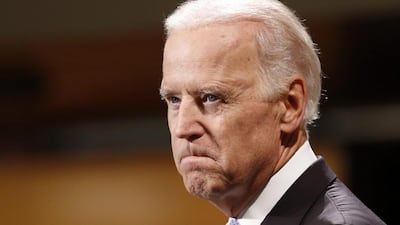Sheikh Mohammed bin Zayed, Crown Prince of Abu Dhabi and Deputy Supreme Commander of the Armed Forces, received a phone call from US vice president Joseph Biden on Sunday apologising for his remarks that appeared to implicate the UAE in helping to arm Syrian extremists.
In the phone call, Mr Biden apologised for a speech he gave at the John F Kennedy Jr Forum at Harvard University's Institute of Politics last week in which he blamed the US's Sunni allies for funding and arming extremists in Syria. He specifically named Turkey, Saudi Arabia and the UAE, saying they had backed the growth of some of the terrorist organisations in the region.
Mr Biden added that the United States appreciates the UAE’s historic role in combating extremism and terrorism as well as its advanced position in this respect, the state news agency, Wam, reported.
Mr Biden also hailed the UAE’s close cooperation with the international community on bolstering the foundations of stability and safety in the region.
In the phone conversation, Mr Biden praised the bilateral relations between the US and UAE and looked forward to building ways of supporting and enhancing the strategic cooperation between the two friendly countries.
The two sides emphasised the common view of the two countries on combating and confronting terrorist organisations and their deviated and extremist ideology, which demands a regional and international effort to combat, besiege and eradicate them and dry out their financial resources.
They also emphasised the importance of international cooperation and all efforts that would put an end to these organisations and their terrorist practices, and that at the forefront of this cooperation comes the current international coalition that is fighting these organisations and foiling its goals of spreading chaos in the region.
Earlier on Sunday, Dr Anwar Gargash, the Minister of State for Foreign Affairs, expressed "astonishment" at accusations made by Mr Biden that the UAE helped to arm Syrian extremists.
“Our allies in the region were our largest problem in Syria,” said Mr Biden in his speech at Harvard University, claiming that Turkey, Saudi Arabia and the UAE in a sense they started a “proxy Sunni-Shia war” by pouring “hundreds of millions of dollars and tens of thousands of tons of weapons” towards anyone who would fight against the Assad regime.
But Dr Gargash hit back on Sunday, saying that Mr Biden had “ignored the steps and effective measures” taken by the UAE and its clearly announced position in the past about financing terrorism, “which comes as part of a more comprehensive political stand against this plague”.
The UAE, Saudi Arabia, Jordan, Bahrain and Qatar all took part in US-led airstrikes at the end of last month, with the UAE Air Force launching its first strikes against ISIL targets on September 22.
On Saturday, Mr Biden’s office said that “the vice president apologised for any implication that Turkey or other allies and partners in the region had intentionally supplied or facilitated the growth of ISIL or other violent extremists in Syria”.
newsdesk@thenational.ae
* Additional reporting by Agence France-Presse

